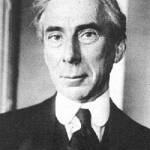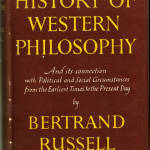
Reprising this from Thomas Akehurst’s Philosophy Now essay on why Bertrand Russell blamed German fascism on German philosophy:
“What is less well known is that in the 1930s and 1940s Russell’s attention turned to the idea that the origins of Nazism were primarily philosophical.”
Russelll, according to Akehurst, mentioned several German philosophers by name, among them Kant, Fichte, Hegel, Schopenhauer, and Nietzsche, along with other philosophical fellow-travelers such as Rousseau, Mazzini, and even Dewey. In his 1945 A History of Western Philosophy, Russell made his case that these thinkers contributed to the development of fascism. Akehurst is not impressed with Russell’s arguments — neither Russell’s presentation of each philosopher’s views, nor his attempts at connecting their theoretical philosophy to Nazi politics, nor with Russell’s failure to provide evidence that the Nazi politicians read the philosophers.

I haven’t read Russell’s History since grad school, but I do remember concluding then that Russell was not at his best as historian of philosophy. Still, that isn’t to say that Russell wasn’t on to something and that a good case can’t be made. Indeed, the work of later scholars such as Richard Wolin, Emmanuel Faye, and Zeev Sternhell have borne out Russell’s conjectures.
Akehurst is right to point out that thinkers in the Anglo-American tradition can be too quick to connect the work of Continental philosophers to the worst manifestations of European politics. But it’s also true that philosophers friendly to the Continental tradition can be too quick to set aside that tradition’s very real complicity in Europe’s political disasters.
Source: Thomas Akehurst, “Bertrand Russell Stalks the Nazis”, Philosophy Now, Jul/Aug 2013. (Thanks to Robert Hessen for the link.)
Related — my explanation:
Popper had a similar but more nuanced view, along the lines that the influence was not direct: the philosophers did not necessarily preach totalitarianism and the totalitarians did not neccesarily read the philosophers. Popper considered that some influential German philosophers after Kant undermined rationality and the standards of intellectual life, including clarity in writing , and that reduced the capacity of intellectuals and educated people to maintain the traditions and institutions that are required for tolerance and orderly government.
Hi Rafe: I recall Popper making that argument but not precisely where. Do you know where in Open Society he states it?
Hi Stephen, that was mostly in the big chapter on Hegel. This has been much criticized by supporters of Hegel and I left it out of my Condensed Popper because I have not read Hegel well enough to have an independent opinion and I was not prepared to uncritically recycle Popper’s view.
http://www.the-rathouse.com/OpenSocietyOnLIne/AATheProjectwithIndex.html
The same applies to my Guide to The Open Society in the series of Amazon e books.
There is a paper “against big words” which is a critique of contemporary German obscurantism that he traced back to Hegel
http://www.the-rathouse.com/shortreviews/Against_Big_Words.pdf
If you want to use it I will find the reference, it is in one of the posthumous collections.
Thanks, Rafe. I’ll look it over again.
I haven’t read as nearly as much Hegel as Kant but to my mind enough to see his totalitarianism as unequivocal, but in seed form, not explicit.
He wasn’t an unabashed totalitarian in the sense of an ideologue like Mussolini. Robert Nisbet in ‘History of the Idea of Progress’ notes that the state of Hegel’s adulation was 19th century Prussia and there’s no reason to think he would have been anything but horrified by the Third Reich. Nonetheless I hold with others that his theory did much to lay its foundations, creating the inertia that led to it and the rest of the succession of totalitarian regimes left and right that proved the catastrophic scourge of the 20th century.
I don’t think he would have been possible without Kant: his radical delimitation of the boundaries of reason to effective solipsism and his anti-self ethic. The former had the effect of removing the check of reason. The latter the effect of removing morality. A self is an individual in the first person. Kant’s denial of the ethical concept of the self was the sine qua non for the denial of the newly emerging, still philosophically fragile political concept of the individual and individual rights.
Kant maintained that the autonomous moral self by means of the pure practical reason exercising the faculty of judgment must be legislator of the categorical imperative, his highest principle of moral action. But it was a self in which the moral rights of its nature, reason, interests, emotions, values and circumstances had been expunged, including the corrupting temptations of “philanthropic concerns” (see his response to Benjamin Constant) which might distract him from the efficient discharge of his duties, whatever he accepted those to be.
These removed there was was left a void of purpose in Kantian Man, hence, I suggest, a receptivity to an ideal supreme source of imperatives that transcended his private concerns. When Hegel, echoing Kant said, “The noble type of consciousness … assumes a negative attitude towards its own special purposes, its particular content and individual existence, and lets them disappear. This type of mind is the heroism of Service” and, “The State is the realization of the ethical idea…. We must … worship the State as the manifestation of the Divine on Earth” – it was a small step from self to state as moral arbiter. For, as Hegel maintained, it was in the state that the individual’s true self, will and purpose were embodied and actualized and where the ethical idea was realized.
Kant fashioned the form of the imperative; Hegel supplied the content.
“Mark this well, you proud men of action!” he said, “you are, after all, nothing but unconscious instruments of the men of thought.” In German universities, already in the thrall of thinkers like Luther, Hamann, Jacobi, Kant, Fichte and Herder, Hegel’s ideas exercised sway over other professors, and they in turn over the great masses of their students, who would pour forth from their portals into German society to become its writers, editors, journalists, poets, intellectuals, civil servants, army officers, teachers, politicians, artists, composers, librettists, professors and philosophers in their own right, until directly and indirectly his ideas came to permeate the intellectual, cultural, and ultimately political life of the nation, subsequently the rest of Europe and then much of the world.
The German man in the street may not have known Kant, Fichte, Hegel, Schopenhauer and other German philosophers, but the notions with which they had seeded his culture resonated in his soul with self-evident familiarity. There were rightist and leftist strains of Hegelianism, nationalist (völkisch) and internationalist (class-based) giving rise to fascism and communism respectively. As members of the Young Hegelians Moses Hess, Mikhail Bakunin, Karl Marx and Frederick Engels, the respective founders of Zionist, anarchist and Marxist socialism were deeply influenced by Hegel’s thought. Though later denouncing him, Marx adapted many of Hegel’s central themes and tenets to his own system.
William L. Shirer in “The Rise and Fall of the Third Reich”:
“[Hegel’s] is the subtle and penetrating mind whose dialectics inspired Marx and Lenin and thus contributed to the founding of Communism and whose ringing glorification of the State as supreme in human life paved the way for the Second and Third Reichs of Bismarck and Hitler. To Hegel the State is all, or almost all. Among other things, he says, it is the highest revelation of the ‘world spirit’; it is the ‘moral universe’; it is ‘the actuality of the ethical idea … ethical mind … knowing and thinking itself’; the State ‘has the supreme right against the individual, whose supreme duty is to be a member of the State … for the right of the world spirit is above all special privileges …’ …As one reads Hegel one realizes how much inspiration Hitler, like Marx, drew from him, even if it was at second hand. Above all else, Hegel in his theory of ‘heroes,’ those great agents who are fated by a mysterious Providence to carry out ‘the will of the world spirit,’ seems to have inspired Hitler … with his own overpowering sense of mission.”
I recently came across this and I don’t know if its relevant but I think Russell may have got this idea from Santayana’s Egotism in German Philosophy.
The 20th century led to techno-logical progress to the nth degree. while ethics trailed far behind.
(Think of how the West’s treatment of the Germans- even those innocent of wrong; doing led to the rise of Hitler.)
with German ingenuity and focus, the Naxis
could take over and build their war machine while the rest of the West slept.
I began reading Russell not too long ago on the matter. I haven’t made it too far into it all but I find it interesting that there has been doubt brought up pertaining to Russell. It’s a shame because he was alive at the time and would’ve had a better idea of events of his lifetime than someone looking back and having to sort the information by historical context. Some of the claims by Akehurst seem fairly suspicious to me. Particularly him mentioning that Russell offered no proof that the Nazis had in fact even read any of the philosophy in question. Hitler uses the term ‘a priori’ or ‘posteriori’ in Mein Kampf at one point. I can’t recall which because it’s been a while since I’ve read it but that sort of stood out a bit to me. That’s a loose connection but that terminology isn’t exactly common vernacular and it’s definitely popular among German philosphy. There’s also Houston Stewart Chaimberlain, who had an understanding of Kant and Nietzsche. Being influenced by philosophy isn’t even a matter of having read the works. The gist of philosphical ideas pass on into culture. I was fairly Lockean before ever reading Locke. I had Thomas Paine in my heart before I even opened any of his works.
I suppose there’s a chance that Russell is completely wrong. There’s always a chance. I do have to wonder when looking at the movement in Italy. Gentile speaks like Hegel. To me it seems like Gentile’s concept of ‘freedom’ is Hegel’s concept of ‘freedom’ and it seems even more suspicious considering Hayek—in The Road To Serfdom—when he speaks about the movements in Europe redefining the word ‘freedom.’ It seems that Hayek is operating on a British version of ‘freedom.’
This whole topic has sparked my curiousity quite a bit. I wish there was a place for answers on this.